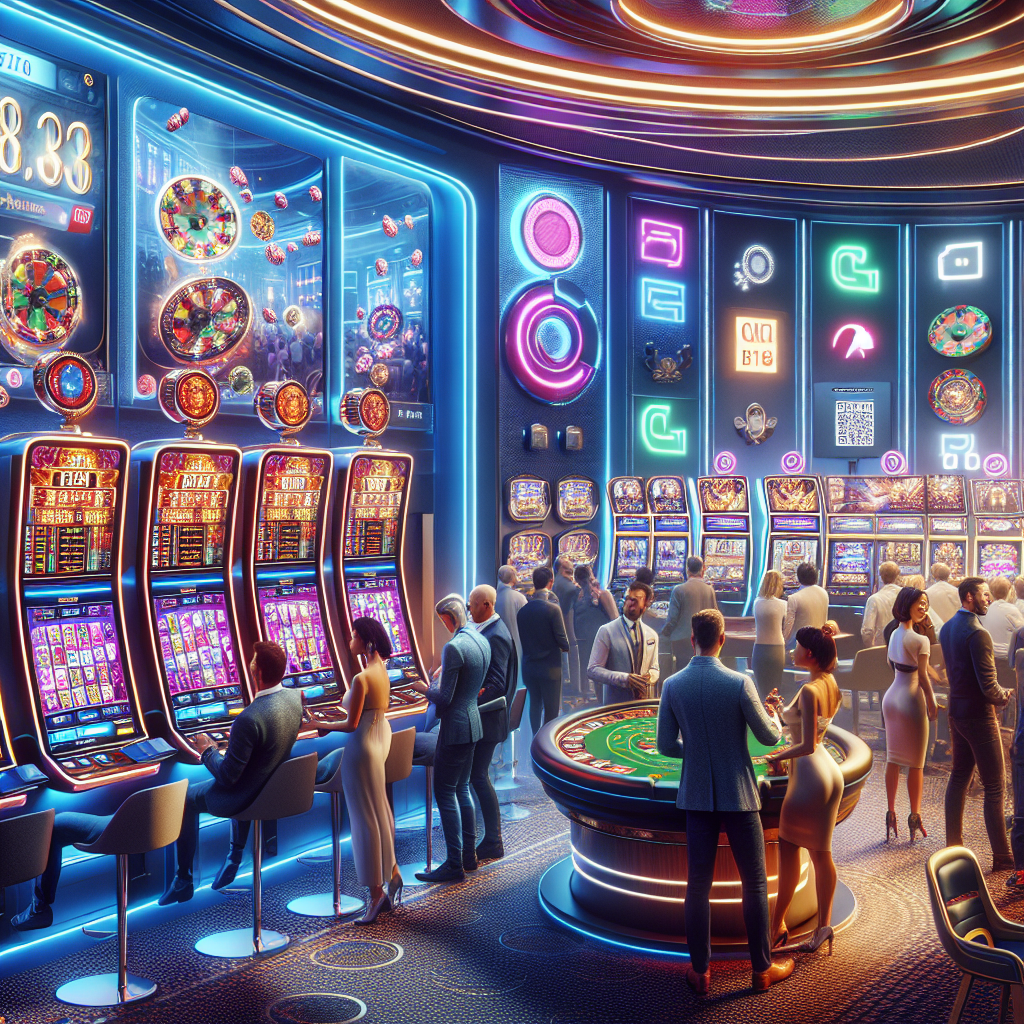In recent years, the online casino industry has witnessed a remarkable transformation, driven by advancements in technology and changing consumer behaviors. As we navigate through this digital evolution, it’s clear that the future of online casinos promises to be as thrilling as the games they offer. This exploration delves into the various facets of this evolving landscape, from the rise of virtual reality to the impact of blockchain technology. By examining these developments, we can gain insights into how online gambling is set to change and what this means for players and operators alike.
Navigating the Digital Transformation of Casinos
The digital transformation of casinos is not just a trend; it’s a complete overhaul of the gambling experience. Online platforms are rapidly adopting new technologies to create more immersive, secure, and engaging environments for their users. This shift is largely driven by the need to cater to a younger, more tech-savvy demographic that demands convenience and innovation. With the introduction of mobile gaming, casinos have broken geographical barriers, allowing users to play their favorite games anytime, anywhere. The integration of sophisticated software ensures fair play and randomness, crucial for maintaining trust. As digital wallets and cryptocurrencies become more mainstream, online casinos are also evolving their payment methods, offering faster, safer transactions. The future points towards a more connected and accessible world of online gambling, where the lines between virtual and reality blur.
The Rise of Virtual Reality in Online Gambling

Virtual Reality (VR) technology is set to revolutionize the online gambling experience by offering players unprecedented immersion into digital casino worlds. Imagine donning a VR headset and walking into a meticulously designed casino, interacting with other players and live dealers in real-time, all from the comfort of your home. This level of immersion can significantly enhance the thrill of gambling, making it more engaging and realistic. Developers are already experimenting with VR slots and table games, pushing the boundaries of what’s possible in virtual gambling spaces. However, the widespread adoption of VR in online casinos will depend on the availability of affordable VR equipment and the continuous improvement of internet speeds. Nonetheless, as these technological hurdles are overcome, VR could become a standard feature of online gambling.
Blockchain Technology: A Game-Changer for Casinos
Blockchain technology is heralding a new era for online casinos, offering unprecedented levels of transparency, security, and fairness. By utilizing decentralized ledgers, casinos can provide proof of fairness in game outcomes, reducing the trust gap between operators and players. Moreover, blockchain enables the use of cryptocurrencies, which are becoming an increasingly popular payment method due to their anonymity and low transaction fees. Smart contracts automate payouts, eliminating human error and reducing withdrawal times. The immutable nature of blockchain also significantly enhances security, protecting against fraud and hacking. As blockchain technology continues to mature, its adoption in online casinos will likely become more widespread, redefining the standards of online gambling.
| Emerging Technology | Impact on Online Casinos |
|---|---|
| Virtual Reality (VR) | Creates immersive, lifelike casino environments for players. |
| Blockchain | Improves transparency, security, and enables crypto payments. |
| Artificial Intelligence (AI) | Enhances personalization, fraud detection, and customer service. |
| Mobile Optimization | Enables seamless gaming across all devices, especially smartphones. |
| Live Dealer Technology | Combines the thrill of real-time interaction with online convenience. |
The Role of Artificial Intelligence in Betting
Artificial Intelligence (AI) is transforming the online betting industry by personalizing the gambling experience and enhancing operational efficiency.
- AI can analyze player behavior to offer personalized game recommendations and bonuses, improving user engagement.
- On the operational side, AI-powered algorithms can detect fraudulent activities and identify problem gambling, aiding in regulatory compliance and responsible gaming initiatives.
- Chatbots and virtual assistants provide 24/7 customer support, improving user satisfaction.
- Moreover, AI is refining the odds calculation process, creating more competitive and accurate betting odds.
- As AI technology evolves, its application in online betting will become more sophisticated, further personalizing and securing the gambling experience.
Regulatory Challenges in the Evolving Casino Landscape
The rapid evolution of online casinos poses significant regulatory challenges. As technology advances, regulators struggle to keep pace with new developments, creating a complex legal landscape for operators. The introduction of cryptocurrencies and blockchain technology complicates matters further, with questions around legality and financial oversight. Additionally, the global nature of the internet raises jurisdictional issues, as players can access sites from countries where those casinos may not be legally recognized. Regulators are also concerned with protecting consumers from fraud and promoting responsible gambling. To address these challenges, regulatory bodies around the world are reevaluating their frameworks and considering new approaches, including technology-based solutions to ensure compliance and protect players.
Predicting the Next Decade of Online Gambling Trends
Looking ahead, the next decade of online gambling is set to be shaped by further technological innovations, regulatory adjustments, and shifting player expectations. Virtual reality and augmented reality could become commonplace, offering immersive gambling experiences that blur the lines between the physical and digital worlds. Blockchain and cryptocurrencies will likely gain wider acceptance, providing a secure and transparent framework for online gambling operations. Additionally, the integration of social elements, such as multiplayer games and online tournaments, will foster a sense of community among players. As AI becomes more integrated into our daily lives, its role in personalizing the online gambling experience will also expand. However, the growth of online gambling will also prompt more stringent regulatory measures to ensure fair play and protect vulnerable individuals. The future of online casinos is bright, but it will require careful navigation of the technological and regulatory landscapes to realize its full potential.
The evolution of online casinos is emblematic of the broader digital transformation sweeping across industries worldwide. As we look towards the future, it’s clear that technology will continue to play a pivotal role in shaping the online gambling landscape. From the immersion offered by virtual reality to the security provided by blockchain, these advancements promise to enhance the gambling experience for players while challenging operators and regulators to adapt. The journey ahead is fraught with both opportunities and obstacles, but one thing is for certain: the world of online casinos is poised for an exciting next chapter. As this landscape continues to evolve, staying informed and agile will be key to navigating the future of online gambling.



The rise of blockchain seems important. It can really help with fairness in games.
Using cryptocurrencies for payments in casinos is smart! I like the idea of lower fees.
I find it interesting how technology is changing online casinos. VR sounds fun!
“The future of gambling is bright,” says the article. I believe that too!
“More community in online games sounds fun! Multiplayer games are exciting.”
El uso de inteligencia artificial para personalizar la experiencia de juego parece muy útil. Espero que ayude a todos los jugadores.
Los cambios en el paisaje regulatorio son complicados, pero necesarios. Es importante proteger a los jugadores.
Mobile gaming is great! I can play anytime, which makes it so easy.
VR casinos seem amazing! Can’t wait to try walking into a virtual casino.
Es interesante cómo la tecnología está cambiando los casinos en línea. Espero que las mejoras hagan que jugar sea más divertido.
“This post shows how fast things are changing in online gambling. Exciting times ahead!”
‘Regulatory challenges’ are a big issue. Hope they keep players safe from scams.
Blockchain puede ayudar mucho a que los casinos sean más seguros y transparentes. Es un buen cambio para los jugadores.
La realidad virtual suena genial. Imaginar jugar en un casino de verdad desde casa es emocionante.
La idea de jugar en un mundo virtual me hace querer probarlo ya. ¿Cuándo estará disponible?
AI in online betting could improve my experience. Personalized games sound good!